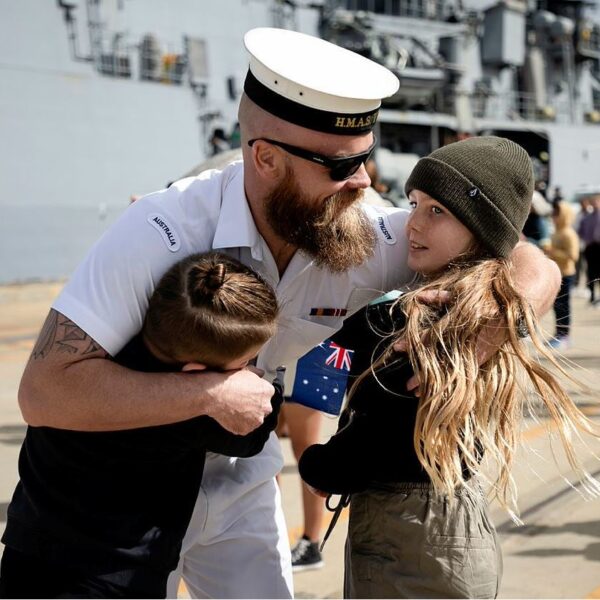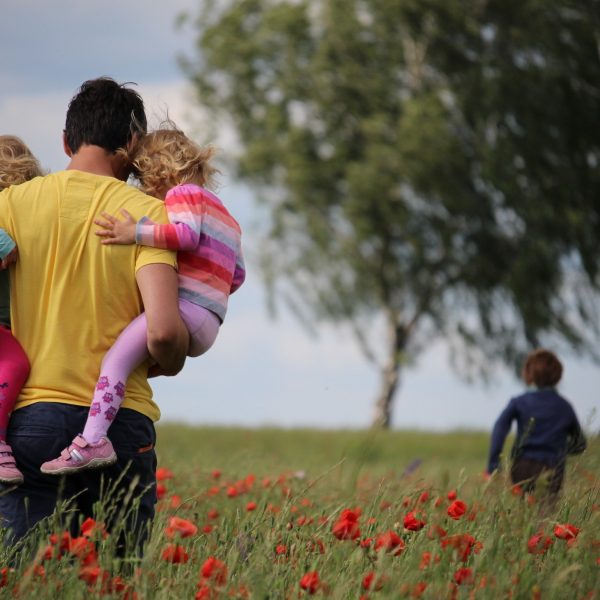New resources to support children living under the cloud of moral injury
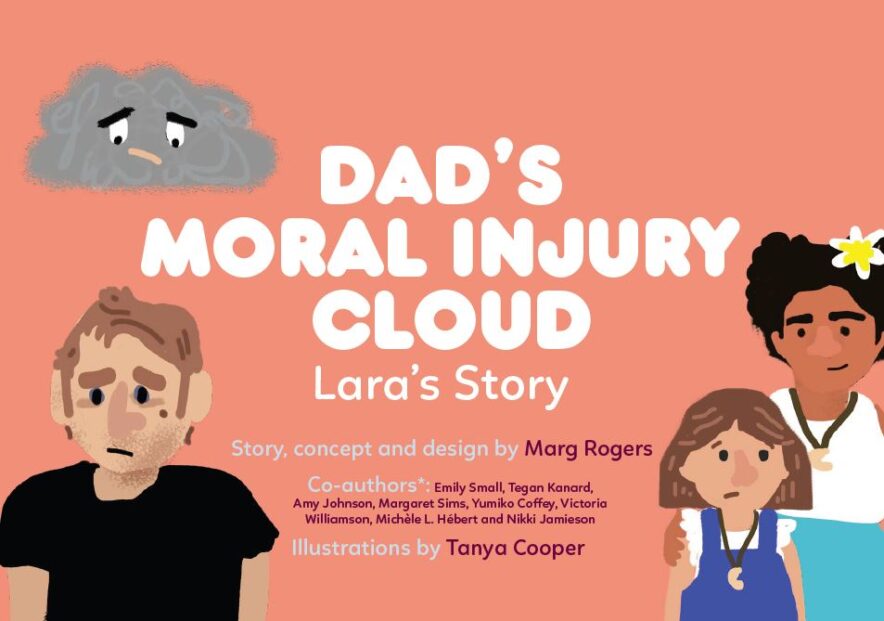
Sometimes, in the course of their invaluable frontline work, those in the Australian Defence Force (ADF), and similar positions, must make decisions which leave them feeling morally conflicted.
When the course of their work is done – be that deployment, the end of the day, or the end of a period of leave – these frontline workers return home, to families, to partners and to children, often while battling with the internal conflict of reconciling who they know themselves to be as a person versus the things they were tasked with doing in the course of their duties.
While there are some resources and supports for families when it comes to dealing with a parent absent on deployment in military families, and the more well-known conditions of post-traumatic stress disorder (PTSD) and physical injuries related to war service, the resources which support with these “moral injuries” are scarce.
For University of New England researcher Dr Marg Rogers, her lived experience of having a family member who returned from the Vietnam war with moral injuries, coupled with the deep learning about the experience of ADF families in the course of her research pointed strongly to the need to create resources which would guide and support those children living in homes where moral injury is present.
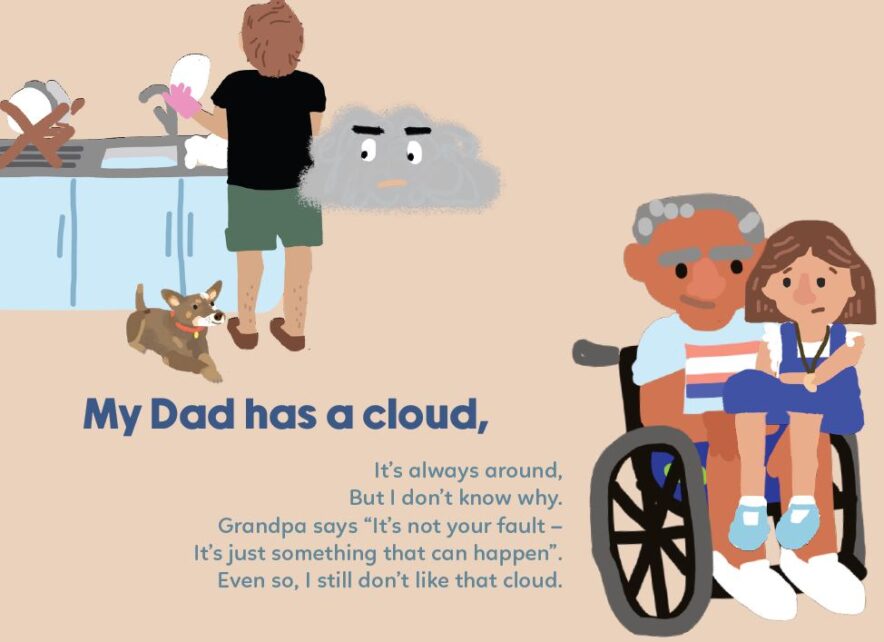
“My uncle had returned from the Vietnam War, and he’d wake in the night from a nightmare and say things like, ‘you don’t understand – I did things I know are wrong!’ There were particular behaviours that stemmed from that. So it was a concept that really hit home for me,” Dr Rogers shared.
“I was at a military, veteran and first responder health conference in Canada in 2022 to present our research, and there were people there who work with service families impacted by a moral injury telling me that research-based resources were needed,” she continued.
Moral injuries are not limited to those in the ADF. They can occur from all kinds of work or life situations, such as an impossible decision faced by a first responder, witnessing bullying or corruption in the workplace, or moments when a past abuse is recalled, and there are particular differences not addressed in any available children’s resources.
“All our resources are different in the way they acknowledge that partners and children suffer along with their parent where there is an injury or trauma, and they have a particular focus on helping build understanding, strength and coping skills in children and their support networks,” Dr Rogers said.
“A moral injury can be a precursor to mental health conditions like PTSD, depression or anxiety, but the difference with a moral injury is the sense of shame and distrust and feelings of disgust it creates.That can manifest in someone not wanting to do things or join activities or organisations because of their general distrust. This attitude can filter down into the lives of their children.”
Those living with moral injury can also become easily frustrated, for example with a child whinging over a seemingly trivial problem, because of a difference in perspective due to their experience.
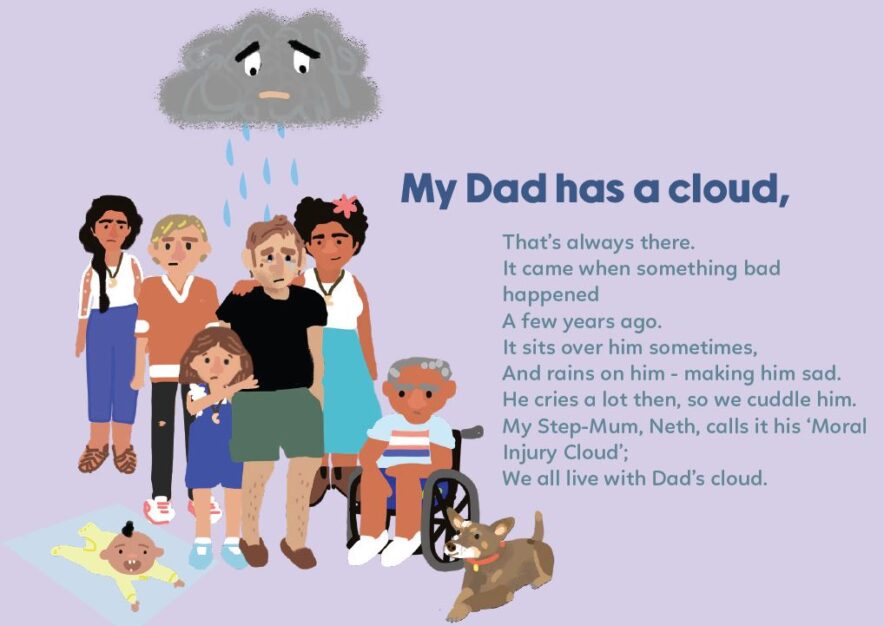
“Someone with a moral injury can then struggle to connect with their partner and children, because of this difference of perspective and their sense of being unworthy or sense they have a toxicity that will rub off on others,” Dr Rogers explained.
“Children can then end up feeling a sense of neglect or that their parent doesn’t love them, which can present in them acting out, experiencing increased anxiety and a lowered sense of confidence,” she added.
One of the challenges in developing a storybook to help children understand what is happening when they have a parent with a moral injury was trying to find the common ground in experience and effectively pictorialising it.
“I came up with the idea of having a cloud hanging over someone with a moral injury – because that’s often what lived experience narratives sounded like, then our team’s ideas flowed from there,” Dr Rogers says.
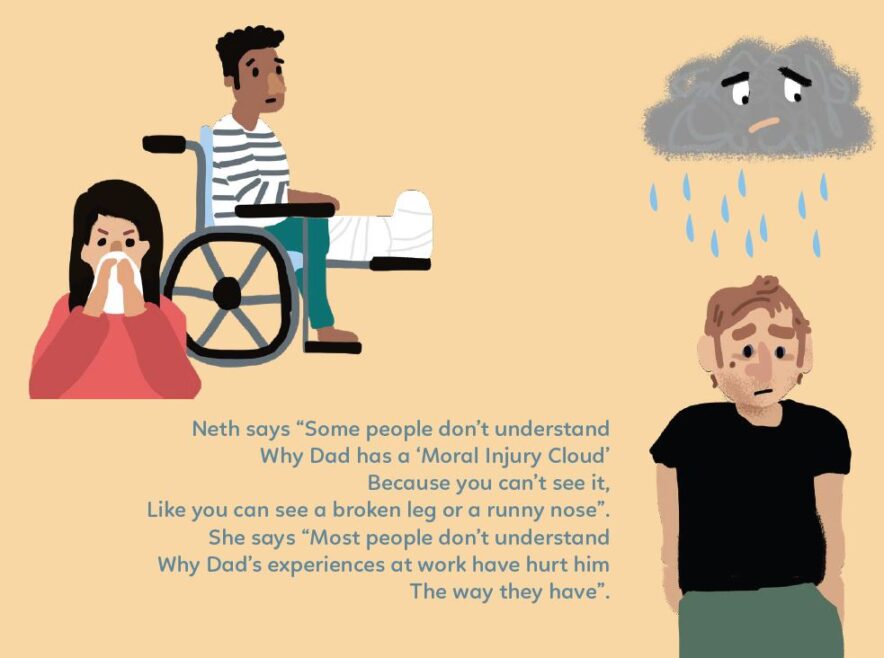
“It was also difficult to tread the line between not wanting the story to be too rosy, but also not wanting it to be all doom and gloom. We wanted to show children what they can do to help in this situation, but not put the responsibility on them to fix anything.”
Along with the storybook for children developed by the team is an interactive module which includes videos explaining moral injury and experiences with it, information on behavioural impacts, how to support people and where to go to find support in the UK, Canada and Australia. A support worker module is also in development, so that support workers can better assist potentially vulnerable children.
As with all the resources developed by the Children and Family Resilience Programs team, the book and module have been developed in collaboration with many researchers, support workers, clinicians and those with lived experience. The book and module are currently available for feedback, including in a formal trial with the King’s College Centre for Military Health Research with families in the UK.
The final, free, online version of ‘Dad’s Moral Injury Cloud: Lara’s Story’ and parent module are due out at the end of July. They’ve been developed with a grant from the Foundation of Graduates in Early Childhood Studies and in-kind funding from the Manna Institute and can be found on the Children and Family Resilience Programs website.
If this article has raised any upsetting issues for you, please reach out for support: Lifeline 13 11 14 (24-hour support for all Australians).
Popular

Economics
Provider
Quality
Workforce
3 Day Guarantee comes into effect: New CCS rules unlock access for families and children
2026-01-05 06:30:55
by Fiona Alston

Practice
Quality
Research
The transformative power of affection: How nurturing care shapes early childhood development in Guatemala
2026-01-07 07:00:56
by Fiona Alston

Quality
Practice
Research
Crayola Creativity Week 2026 launches as research highlights strong link between creativity and confidence
2026-01-06 07:00:35
by Contributed Content













